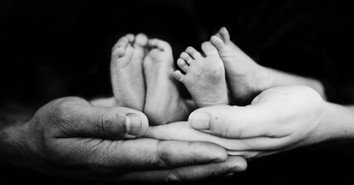This is What You Miss When You Skip Church

Recently, I was talking with a few coworkers about friendship. We had all recently read a new book by Lisa-Jo Baker about the topic, and there was a line in it that had resonated deeply with us: “Maybe the most radical, intimate thing we can do for our friends is to show up.”
So often, that’s the key: just showing up.
I think about that every time I’m tempted to cancel a coffee date because I’d really rather just have a lazy morning, or when I want to bail on a dinner with friends in favor of Netflix, and even when I’m tempted to skip church on a Sunday morning.
It’s easy to get in a selfish mindset, thinking that what I do and what I don’t do are my choices to make, and that they only affect me… but in reality, our showing up (or our lack of showing up) makes a difference. It really is a radical and intimate thing to show up for our friends, our people, our community. We can often think our presence or our absence won’t really matter to anyone else, and that church especially will go on as normal whether or not we are there, but what if our being there isn’t about us? What if we need to be there for the others who are getting up and showing up to do the same?
I can think of more than a dozen times right off the top of my head where incredible moments happened with new or old friends in the hallways or aisles of my church, and those never would have happened if I had stayed home. I know for a fact I wasn’t feeling 100% jazzed about being at church every time those holy moments happened, but I was there, I was available, and the Lord used my presence to create connections and build community with others who were there and available, too. It wasn't about me at all -- it was about what God did when I simply showed up.
Tim Challies recently wrote an article on “The Worst Consequence of Skipping Church” and he makes it clear that “the first sin of skipping church is the sin of failing to love others.”
It’s hard to love others well when we don’t show up for them. It’s hard to love the church (both the place and its people) when we don’t show up for it.
“Gathering with God’s people is not first about being blessed but about being a blessing,” Challies writes. “It’s not first about getting but about giving.”
What a shift it is to think about showing up like that!
Many Christians approach going to church in the mindset of “what can I get out of this” and they’re often quick to leave a church if they feel it isn’t “meeting their needs” but I’m convicted by the thought that it should be so much less about us.
Challies zeroes in on a passage of Scripture that is extremely relevant to this conversation. Hebrews 10:24-25 says this:
“And let us consider how we may spur one another on toward love and good deeds, not giving up meeting together, as some are in the habit of doing, but encouraging one another—and all the more as you see the Day approaching.”
The big risk that comes when we skip church is less about ourselves (although we do put ourselves in greater danger for what Challies calls “spiritual temptation, spiritual decline, and even spiritual death”) and more about others. Like the verse in Hebrews said, our focus should be on spurring one another on and encouraging each other. When we don’t show up, we really are guilty of “the sin of failing to love others.”
That should convict us.
What would it look like if we started to shift our focus away from ourselves and more toward how we can better love and serve those around us? What if we began to show up even when it feels challenging, just so we could be there for others? What if we cared less about getting, and more about giving? What if we considered how to spur one another on?
Wouldn’t that start to be a beautiful picture of God’s kingdom in our communities?
The next time I’m tempted to cancel plans or skip church, I want to remember this: it’s a radical thing to simply show up for people. And I know that when I do, when I gather with two or more, Jesus is there with us (Matthew 18:20). That’s something I don’t want to skip out on.
Photo credit: Unsplash
Publication date: April 28, 2017
Rachel Dawson is the editor of BibleStudyTools.com.
Originally published April 28, 2017.





